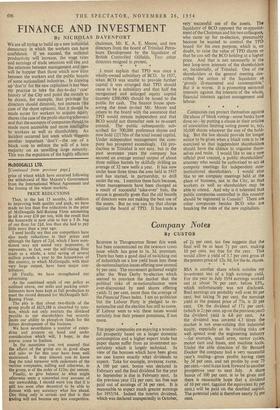FINANCE AND INVESTMENT
By NICHOLAS DAVENPORT
We are all trying to build up a new industrial democracy in which the workers can have confidence. If we succeed, the national productivity will increase, the wage rates and earnings of trade unionists will rise and the relations between management and men will be happier' than those which now exist between the workers and the public boards of some nationalised industries. In drawing up 'don'ts' for the new capitalism it has been my practice to take the, day-to-day 'case' history of the City and point the morals to be drawn, for example, that privilege for directors should diminish, not increase (the case of the share options), that it should be made easier for workers to acquire equity shares (the case of the profit-sharing schemes) and that the accounts of companies should be made more accessible and more intelligible to workers as well as shareholders. An incident occurred last week which suggests another important `don't'—the use of a block vote to enforce the will of a bare majority on an unwilling large minority. This was the expulsion of the highly efficient
chairman, Mr. K. A. E. Moore, and two directors from the board of Trinidad Petro- leum Development by the liquidator of British Controlled Oilfields. Two other directors resigned in protest.
•• •
I must explain that TPD was once a wholly-owned subsidiary of BCO. In 1937, when BCO was unable to provide further capital it was arranged that TPD should cease to be a subsidiary and that half the reorganised and enlarged equity capital (namely £500,000) should be issued to the public for cash. The finance house spon- soring the issue invited Mr. Moore and others to the board with the assurance that TPD would remain independent and that BCO would not thereafter seek to re-assert control. The public subsequently sub- scribed for 700,000 preference shares and now hold 12/17ths of the total issued capital. Under independent management the com- pany has prospered exceedingly. Oil pro- duction in Trinidad is not easy, but in the past seventeen years the company has secured an average annual output of about three million barrels by skilfully 'drilling an average of 32 new wells a year. It has now under lease three times the area held in 1937 and has started, in partnership, to drill under the sea. I mention these facts because, when managements have been changed as a result of successful 'take-over' bids, the excuse is generally given that the old boards of directors were not making the best use of the assets. But no one can lay that charge against the board of TPD. It has made a very successful use of the assets, The liquidator of BCO opposed the re-appoint- ment of the Chairman and his two colleagues, who came up for re-election, presumably because he wanted to control the TPD board for his own purpose, which is, no doubt, to raise the value of TPD shares so that he can sell the BCO holding at a higher price. And that is not necessarily in the best long-term interests of the shareholders or, incidentally, of Trinidad. One of the shareholders at the general meeting des- cribed the action of the liquidator as `grossly ill-mannered and contemptible.' But it is worse. It is promoting sectional interests against the interests of the whole, financial interests against management and labour.
• • •
Companies can protect themselves against the abuse of block voting—some banks have done so—by putting a clause in their articles of association limiting voting power to, say, 10,000 shares whatever the size of the hold- ing. But the law should provide for longer notice to be given when a block vote is to be exercised so that independent shareholders should have the chance to organise them- selves and resist. I would like to see a new official post created, a public shareholders' attorney who would be authorised to act at company meetings for independent non- institutional shareholders. I would also like to see company meetings held at the place of business, not in the City, so that workers as well as shareholders may be able to attend. And why is it tolerated that public companies controlled in this country should be registered in Canada? There are other companies besides BCO who are breaking the rules of the new capitalism.










































 Previous page
Previous page